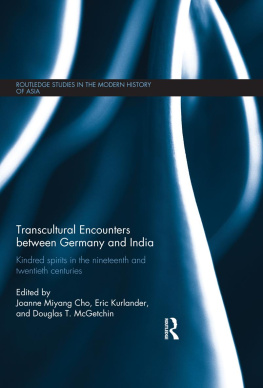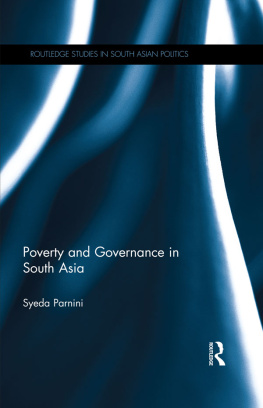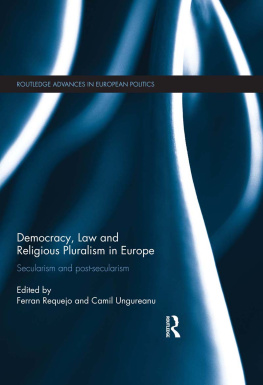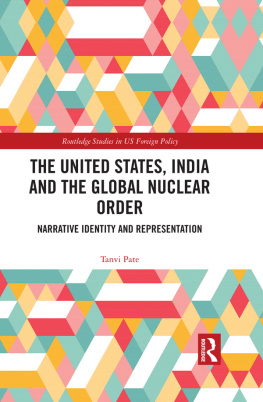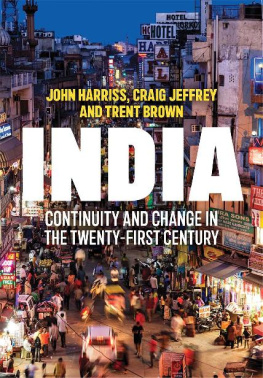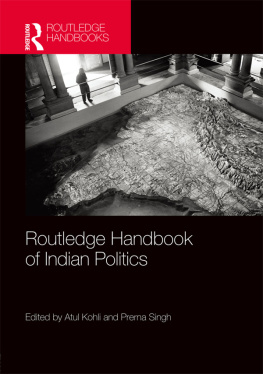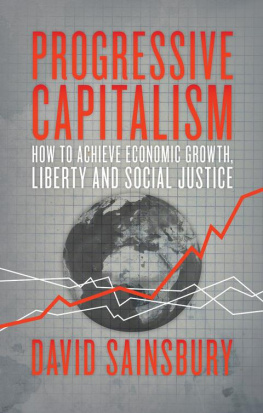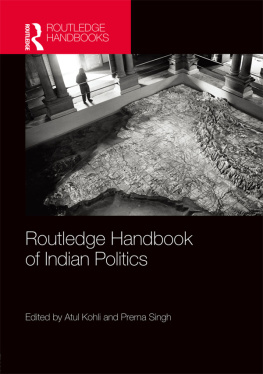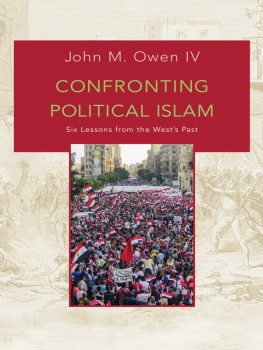
Political Theory and South Asian Counter-Narratives
This book evaluates the promise of human progress and secularism in grand political narratives of the nineteenth and twentieth centuries, comparing counter-narratives of South Asia within the context of a fast-changing twenty-first century.
The book embraces a broad range of sources and theoretical approaches that include political philosophy, film and ideological discourse analysis. In the twenty-first century, global inequality and significant growth of religious and majoritarian nationalisms have been appended with a protracted economic slowdown and recession in many countries. Examining what went wrong in terms of secularism and distributive justice in India, this book critiques the Euro-American visions of democracy, global capitalism, and their so-called universality. As an alternative, it proposes a progressive politics of radical democracy for the Indian people.
Reconsidering alternatives to capitalism, secularism and the radical possibilities of Islamism, Political Theory and South Asian Counter-Narratives will appeal to students and scholars of political theory, international relations, global history, and South Asian politics.
Maidul Islam is a political scientist at the Centre for Studies in Social Sciences, Calcutta. His primary research interests are in political theory and contemporary South Asian politics. He is the author of Limits of Islamism (2015) and Indian Muslim(s) after Liberalization (2019).
Routledge Studies in South Asian Politics
Hindu Nationalism in India
Ideology and Politics
Bidyut Chakrabarty and Bhuwan Jha
Electoral Politics and Hindu Nationalism in India
The Bharatiya Jana Sangh, 19511971
Koushiki Dasgupta
Government and NGOs in South Asia
Local Collaboration in Bangladesh
Mohammad Jahangir Hossain Mojumder and Pranab Kumar Panday
Parliaments in South Asia
India, Pakistan and Bangladesh
Nizam Ahmed
Pakistans Security and the India-US Strategic Partnership
Nuclear Politics & National Security
Syed Shahid Hussain Bukhari
Pakistans National Security Approach and Post-Cold War Security
Uneasy Co-existence
Arshad Ali
Political Theory and South Asian Counter-Narratives
Maidul Islam
Islam and Democracy in the Maldives
Zahir Azim
For more information about this series, please visit: www.routledge.com/asianstudies/series/RSSAP
First published 2022
by Routledge
2 Park Square, Milton Park, Abingdon, Oxon OX14 4RN
and by Routledge
605 Third Avenue, New York, NY 10158
Routledge is an imprint of the Taylor & Francis Group, an informa business
2022 Maidul Islam
The right of Maidul Islam to be identified as author of this work has been asserted by him in accordance with sections 77 and 78 of the Copyright, Designs and Patents Act 1988.
All rights reserved. No part of this book may be reprinted or reproduced or utilised in any form or by any electronic, mechanical, or other means, now known or hereafter invented, including photocopying and recording, or in any information storage or retrieval system, without permission in writing from the publishers.
Trademark notice: Product or corporate names may be trademarks or registered trademarks, and are used only for identification and explanation without intent to infringe.
British Library Cataloguing-in-Publication Data
A catalogue record for this book is available from the British Library
Library of Congress Cataloging-in-Publication Data
A catalog record has been requested for this book
ISBN: 978-1-032-04854-3 (hbk)
ISBN: 978-1-032-05210-6 (pbk)
ISBN: 978-1-003-19657-0 (ebk)
DOI: 10.4324/9781003196570
To those who want a peaceful and progressive South Asia
Most ideas presented in this book were developing in the last decade. By the time I was awarded the doctorate in Politics by Oxford University in 2012, permanent academic jobs in England were few. Abigail Green gave a piece of sane advice to return to India because higher education was growing in my own country. The advice proved to be fruitful. Teaching and research in the domain of political theory in India from 2012 has been exciting. This book is an attempt to think and rethink political theory. It is not a standard textbook. Instead, it engages with political theory in the Euro-American academy and reflects on the contemporary political scene in South Asia.
I thank all staff and faculty of the Centre for Studies in Social Sciences, Calcutta (CSSSC). They have made the research institute of CSSSC an excellent place to work.
is a revised version of a paper presented in a conference at the Indian Institute of Advanced Study, Shimla. I am grateful to Partha Chatterjee, Gopal Guru, Sundar Sarukkai, Sobhanlal Datta Gupta, Uadyon Misra, Ashok Acharya and Prasenjit Biswas for helpful comments to develop the paper when it was read in March 2015. I am also indebted to Dwaipayan Bhattacharyya with whom some aspects of this paper were discussed. I thank Albeena Shakil for inviting me to present the paper at the academic conference on Is There an Adequate Theory of Justice?
is an updated version of a paper previously published in Socialist Perspective: A Quarterly Journal of Social Sciences in the backlog issue of 2016.
is a modified version of a paper previously published in Studies in Humanities and Social Sciences in the backlog issue of 2012.
was possible because of Devi Vijays consistent requests and patience and several discussions with Anjan Chakrabarti.
is a condensed version of some ideas developed in a round table colloquium in the Department of Political Science, Calcutta University in March 2013. I am grateful to Satyabrata Chakraborty, Sanjeeb Mukherjee and Dipankar Sinha who organised the event. I also thank Aswini Kumar Ray, Parthasarathi Mondal and Bonita Aleaz for a fruitful discussion on the presentation that helped to improve the paper. An earlier draft of the chapter was initially presented at CSSSC in February 2014. Achin Chakrabarty and Subhanil Chowdhury at the Institute of Development Studies, Kolkata made thoughtful comments when the paper was again presented in November 2014. I thank all of them.
is a reformed version of a paper published in St. Antonys International Review in 2017.
was first read in the CSSSC staff webinar in July 2020. I am particularly grateful to the audience for a fruitful discussion.
was possible because persistent pushing from Nandini Bhattacharya made me finally write it. A discussion with Samir Das in 2018 was helpful in writing the preliminary draft of the chapter. A previous version of the chapter was originally presented in an international conference of Ecotones 4 on Partitions and Borders at CSSSC in December 2018 organised by Migrations internationales, espaces et socits (MIGRINTER), UMR-CNRS Universit Paul Valry Montpellier 3, Concordia University in Montreal and CSSSC. It was subsequently modified and presented in a national Seminar on Citizenship in Contemporary Times, sponsored by the Eastern Regional Centre of the Indian Council of Social Science Research and organised by the Institute of Development Studies, Kolkata in November 2019. I thank the organisers and the audience of the two conferences.


